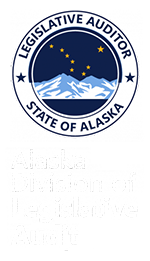| SUMMARY OF: | A Sunset Review of the Department of Commerce, Community, and Economic Development, Board of Public Accountancy, October 25, 2004. |
Purpose of the Report
In accordance with Title 24 and Title 44 of the Alaska Statutes, we have reviewed the activities of the Board of Public Accountancy (BOPA). As required by AS 44.66.050(a), the legislative committees of reference are to consider this report during the legislative oversight process involved in determining if the board should be reestablished. Currently, AS 08.03.010(c)(1) states that the board will terminate on June 30, 2005. If the legislature does not extend the termination date for the board, BOPA will have one year to conclude its administrative operations.
Report Conclusions
In our opinion, the termination date for the Board of Public Accountancy (BOPA) should be extended. The board is serving a public interest by operating in an effective manner in its licensing and regulation of certified public accountants and public accountants. The board is acting in the public interest by promoting the competence and integrity of those who hold themselves out to the public as certified public accountants (CPAs) or public accountants (PAs).
The board continues to make regulation changes, improving its effectiveness of monitoring CPAs and PAs licensed in the State of Alaska; making sure they are competent and capable of maintaining the integrity of the profession. The board is proactively attempting to restore testing sites to Juneau and Fairbanks for the Uniform Certified Public Accountant Examination – which have been closed with the implementation of a new testing process by the American Institute of Certified Public Accountants.
Alaska Statute 08.03.010(c)(1) requires the Board of Public Accountancy be terminated on June 30, 2005. Under AS 08.03.020, if the termination date is not extended by the legislature, the board will have a one-year period to administratively conclude its affairs. We recommend the legislature extend the board’s termination date to June 30, 2009.
Findings and Recommendations
- BOPA should continue to be proactive in providing better access to its primary licensing examination – the Uniform Certified Public Accountant Examination (CPA Exam).
In 2004, the manner in which the CPA Exam is administered in Alaska was changed. Previously, the examination was administered twice a year at a minimum of three testing sites typically located in Anchorage, Fairbanks, and Juneau. The examination spread over two and one-half days; although individuals, who passed previous segments, only had to sit for the parts they had yet to successfully pass.
In 2004, in conjunction with changes of format and structure that were made nationally by the American Institute of Certified Public Accounts (AICPA), the examination was changed to an all-computerized format that could be taken in whole or in parts up to three, and eventually four, times a year. By increasing the availability of the examination across the full year, access for applicants was improved. However, as the new testing regimen was implemented in Alaska, this improved access was offset to a large degree by the restriction in the number of available testing sites. Under the new testing regimen, applicants can only take the examination at one test site located in Anchorage.
Such circumstances make taking the examination much more expensive for applicants in the Interior and Southeast Alaska. Applicants from these regions must now travel to Anchorage, arrange for transportation and accommodations, in addition of having to pay a higher examination fee.
BOPA has adopted a resolution requesting that more testing sites be made available in Alaska for the CPA Exam. BOPA is actively working with NASBA, negotiating on the board’s behalf, to modify the existing contract to provide for more test sites. The board, representatives of the University of Alaska, the state professional society, CPA firms – as well as individual CPAs – recognized the problems involved with having only one test site in Alaska. Individually, and in tandem, some of these groups have been trying to work with NASBA and Prometric to set up an additional testing site.
A central tenet of occupational licensing is that regulatory boards for given professions primarily exist to provide public and consumer protection without unduly restricting or limiting entry into the regulated profession. Accordingly, the board must continue to be proactive, and NASBA should be proactive with the AICPA, to be sure the licensing procedures conform with the public policy objectives of occupational regulation and oversight.

